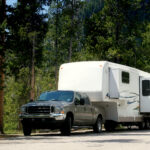In the bustling world of entrepreneurship, understanding the financial health and potential of your business is paramount. This is where the concept of Return on Investment (ROI) plays a crucial role, especially for RV park entrepreneurs aiming to thrive in the competitive North American market.
ROI is a key financial metric that measures the efficiency and profitability of an investment, providing insights into the financial gain relative to its cost. For the RV park industry, where investments span from land acquisition to guest experience enhancements, grasping the essence of RV park ROI is essential.
Through a comprehensive consideration of factors influencing a strong RV park ROI, the critical role of effective campground accounting, and the impact of digital technologies on operational efficiency, we will try to understand what is a good ROI for an RV park and explore how to achieve it.
Factors Influencing RV Park ROI
Mastering the concept of ROI is crucial for steering their ventures toward improving campground profits. In the RV park industry, the expected ROI typically ranges from 10% to 30%, serving as a benchmark for evaluating the success of their investment. This range underscores the potential for significant returns, but it also highlights the variability influenced by several key factors.
The ROI of RV parks is influenced by a mosaic of factors that collectively determine their profitability and growth potential. Understanding these elements is pivotal for entrepreneurs aiming to enhance their business outcomes.
Location
A prime determinant of an RV park’s success, location affects not only the initial land acquisition cost but also the park’s attractiveness to guests. Parks situated near popular tourist attractions or in areas with high demand for RV spots often enjoy higher occupancy rates and can charge premium prices, positively impacting ROI.
Operational Efficiency
Efficiently managing an RV park’s operations—ranging from utility costs to maintenance and staffing—directly influences the bottom line. Operational efficiencies, or the lack thereof, can significantly sway the ROI by affecting the cost structure and the quality of guest experiences.
Guest Services and Amenities
The range and quality of services and amenities offered by an RV park play a critical role in attracting and retaining guests. Parks that provide unique, high-quality amenities can command higher fees and foster customer loyalty, thus enhancing ROI.
Diversifying revenue streams through guest services and amenities is a strategic approach to mitigate the seasonal volatility inherent in the RV park industry. Services such as on-site convenience stores, laundry facilities, rental equipment for outdoor activities, and event-hosting capabilities add value for guests while opening additional income channels for the park.
Seasonal and Long-term Occupancy Rates
The balance between seasonal fluctuations and long-term stays impacts revenue stability and growth. Parks that successfully navigate the seasonal nature of the business by attracting long-term occupants in the off-season can maintain a steadier income stream, bolstering their ROI.
What is a Good ROI for an RV Park?
Determining a good ROI for an RV park involves understanding its CAP rate, a metric that offers insights into the risk, reward, and valuation of real estate investments. CAP rates, or capitalization rates, represent the ratio of a property’s net income to its purchase price, essentially indicating the expected yield of an investment.
To calculate the CAP rate for an RV park, or any real estate investment, you divide the property’s Net Operating Income (NOI) by its current market value (or purchase price). The formula is as follows:
CAP Rate = Net Operating Income (NOI) / Current Market Value (or Purchase Price)
For instance, if an RV park generates an NOI of $200,000 annually and is valued or purchased at $2,000,000, the CAP rate would be 0.10 or 10%
This basic calculation offers a snapshot of the investment’s yield in a single year.
In the US, the average and range of CAP rates for RV parks can vary widely, often reflecting a broader range than many other real estate asset classes. This variance is attributed to the unique nature of RV parks, including their operational complexities and the diverse market demand across different locations.
CAP rates are a reflection of the risk and reward associated with investing in an RV park. Typically, a higher CAP rate suggests a higher perceived risk but also a higher potential return on investment. Conversely, a lower CAP rate indicates a less risky investment but with potentially lower returns.
A good RV park ROI, based on the CAP rate, should also consider the current interest rates and the spread between them. A rule of thumb suggests seeking a spread that allows for a cash-on-cash return that compensates for the investment risk. Ideally, investors aim for a CAP rate that exceeds the interest rate by a healthy margin, ensuring a profitable investment.
This spread is crucial for determining a good RV park ROI, with investors often targeting a CAP rate that provides a return significantly above the cost of financing the purchase, aiming for a 20% or higher cash-on-cash return as a benchmark for a strong investment.
How to Improve Your RV Park ROI
Improving the ROI of an RV park requires a multifaceted approach. The foundation starts with effective campground accounting and management. This involves a meticulous approach to financial tracking, enabling park owners to pinpoint areas for cost reduction while identifying avenues for revenue enhancement.
Thorough tracking and categorization of expenses facilitate a granular understanding of financial flows, aiding in budget optimization and cash flow management. Further, capitalizing on tax deductions, including depreciation and operational expenses, becomes a strategy to reduce taxable income and enhance the bottom line.
Moreover, selecting appropriate accounting software tailored to the unique needs of RV parks streamlines financial management, encompassing everything from booking to maintenance expenses.
Accounting tools provided by companies like QuickBooks offer comprehensive solutions for enhancing financial management and improving RV park ROI. By streamlining campground accounting processes, they can facilitate accurate tracking of income and expenses and simplify bookkeeping tasks, allowing RV park owners to focus on growing their business.
Beyond accounting, the integration of digital technologies plays a pivotal role in streamlining RV park operations and elevating the guest experience. These innovations offer a dual benefit of boosting revenue while curbing costs.
As part of our mission of providing campgrounds with the most effective management and marketing tools, Roverpass developed a variety of digital solutions.
Premium Website Builder was created to help RV parks develop stunning and professional websites that continuously attract new guests. Our designers, SEO strategists, and writers play a key role in developing high-quality RV park websites that get reservations and increase revenue.
You can also connect your website with our campground reservation software, which makes it easy to manage your reservations, payments, and availability. With our software, you can give your guests a smooth reservation experience, who can book your services anytime, anywhere, from any device. This software can also be integrated with Quickbooks accounting software to enhance financial management capabilities.
Stay tuned to our blog for more insights into maximizing your RV park’s potential and navigating the challenges of the industry.






